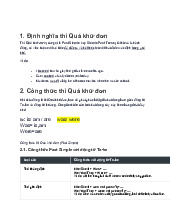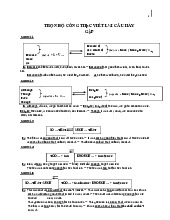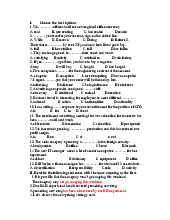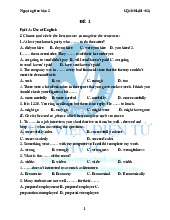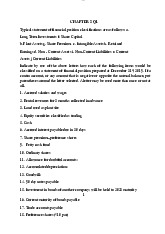











Preview text:
lOMoAR cPSD| 48632119 I. Your Future Job 1. Bản dịch Việt
Tôi còn nhớ, khi tôi còn nhỏ, khi được xem những bộ phim hoạt hình,
đọc sách, tôi ước mơ mình có thể trở thành siêu nhân, công
chúa,...Ước mơ của tôi thay đổi theo từng giai đoạn rồi tôi lại muốn
trở thành những cô ca sĩ xinh đẹp, tài năng, trở thành bác sĩ để chữa
bệnh cho mọi người. Đến năm cấp 3,khi phải lựa chọn trường đại học
mà mình muốn học, tôi mới bắt đầu tìm hiểu xem thực sự mình muốn
gì. Và trong tương lai, tôi muốn trở thành một nhà kiểm toán thành
công. Công việc này là một công việc mà tôi có thể làm trong dài hạn,
đem lại cho tôi một nguồn thu nhập ổn định, và rèn cho tôi tính kiên
nhẫn, tỉ mỉ. Tôi đang hình dung mình sẽ làm việc trong một công ty uy
tín về kiểm toán, nơi tôi có thể thỏa sức đam mê với những con số, sử
dụng kĩ năng của mình để phân tích tài chính, kiểm toán để giúp cho
công ty nơi tôi làm việc. Công việc của tôi sẽ liên quan đến việc quản
lý hồ sơ tài chính, đảm bảo tuân thủ các quy định và cung cấp những
hiểu biết có giá trị để giúp các doanh nghiệp đưa ra quyết định sáng
suốt. Tôi nghĩ công việc này phù hợp với tôi vì tôi thích những con số,
sự tỉ mỉ, cẩn trọng. Tôi mong muốn trở thành một cố vấn đáng tin cậy
cho khách hàng của mình, giúp họ điều hướng bối cảnh tài chính phức
tạp và đạt được các mục tiêu tài chính của họ. Tôi mong muốn được
làm việc trong một môi trường năng động, nơi tôi có thể liên tục học
hỏi và phát triển, theo kịp các xu hướng và phát triển mới nhất trong
lĩnh vực kiểm toán. Và để trở thành một nhà kiểm toán, tôi cần đến
những bằng cấp về các lĩnh vực như kiểm toán, tài chính, các chứng
chỉ như tin học, tiếng anh...và những kĩ năng giao tiếp ứng xử. Bên
cạnh đó, tôi cũng muốn tự kinh doanh một thứ gì như đồ ăn, mĩ
phẩm....Bởi nó làm việc linh hoạt, không bị gò bó thời gian và có thể
kiếm được nguồn tiền không bị giới hạn. Và hiện tại, tôi lựa chọn học
viện tài chính là 1 trong những bước đầu để tiến gần công việc mà tôi
mong. Và tôi sẽ cố gắng đạt được những gì mà mình muốn hướng tới.
Đó là những gì tôi muốn nói về công việc tương lai của mình. Cảm ơn
các bạn đã lắng nghe. 2. Bài dịch việt – anh lOMoAR cPSD| 48632119
Hello everyone. My name’s Thuy. I feel very happy because i have a
chance standing here and speaking to you. Today i will talk about my
future job. I remembered, when I was a child, when I watched
cartoons and read books, I dreamed that I could become a superhero, a
princess,... My dream changed from stage to stage, and then I wanted
to become a beautiful and talented singer, became a doctor to treat
people's diseases. In high school, when I had to choose the university
where I wanted to study, I started to find out what I really wanted. And
in the future, I want to become a successful auditor. This job that I can
do in the long term, bring me a stable source of income, and train me
to be patient and meticulous(tỉ mỉ). I am envisioning working in a
prestigious(uy tín) auditing firm, where I can unleash my passion for
numbers, use my skills to analyze finances, and audit to help the
company where I work. My job will involve managing financial
records, ensuring regulatory(quy định) compliance(tuân theo), and
providing valuable insights to help businesses make informed
decisions. I think this job is suitable for me because I like numbers,
meticulousness, and carefulness .I aim to be a trusted advisor to my
clients, helping them navigate the complex financial landscape and
achieve their financial goals. I look forward to working in a dynamic
environment where I can continuously learn and grow, keep up with
the latest trends and developments in the field of auditing. And to
become an auditor, I need degrees in fields such as auditing, finance,
certificates such as informatics, English... and behavioral
communication skills. Besides, I also want to do my own business
such as food, cosmetics.... Because it works flexibly, is not
constrained by time and can earn unlimited money. And now, I choose
the academy of finance as one of the first steps to get closer to the job
I want. And I will try to achieve what I want to. That's what I want to
say about my future job. Thank you for listening
II. Your opinion about “Politeness” 1. Bản dịch anh
Hi everyone! Frist, I would like to introduce myself. My name’s Thuy. Today, I
would like to share my thoughts on a quality that I believe fundamental to
human interaction: politeness. lOMoAR cPSD| 48632119
What do you think about “politeness” ?. In my opinion, Politeness is often seen
as a simple act of good manners, but it goes far beyond just saying "please" and
"thank you." It is the art of showing respect and consideration for others,
regardless of the situation. Politeness is the foundation of civilized society. It
allows us to communicate effectively, build relationships, and maintain a sense
of harmony in our interactions.
When we are polite, we can create a good attitude with everyone, satisfy the
other person, and easily achieve effective communication. Being polite not only
makes others feel valued and respected, but it also reflects our own personality.
When we are polite, we are acknowledging the dignity of the person in front of
us. We are saying, "You matter. Your feelings, your thoughts, your presence—
they all matter." This recognition can have a profound impact on our
interactions. It can turn a simple conversation into a meaningful exchange, and a
potential conflict into an opportunity for understanding.
Good manners can be shown in various forms of etiquette in our culture. One of
the first things we do to say “please” and “thank you” pretty often in everyday
situations, which we all learn as children. Moreover, Vietnam is a hierarchical
society, which means it’s crucial for the people here to be respectful of their
seniors. For example, when we run into people who are older than us like our
parents, grandparents or our university lecturers, we will greet them and bow our
heads a bit to show our respect.
However, there are also people who behave impolitely. there are many examples
of disrespectful behavior. For example, People are late for appointments. I
believe being late is another act of disrespect. Sure, life happens all the time, and
we all arrive late for something sometimes, but people who have the habit of
being late to work for the same reason are rude and affect others.
Politeness, therefore, it is not just a social nicety; it is a tool for peace,
collaboration, and progress. It is the foundation of every strong relationship,
every successful negotiation, and every thriving community.
So, let us not overlook the power of politeness. Let us embrace, practice, and
spread it—because in doing so, we can make our world a better place, one polite act at a time. Thank you for listening. 2. Bản dịch việt
Chào mọi người! Đầu tiên, tôi muốn giới thiệu bản thân mình. Tôi tên
là Thủy. Hôm nay, tôi muốn chia sẻ suy nghĩ của tôi về một phẩm chất
mà tôi tin là nền tảng cho sự tương tác của con người: lịch sự. lOMoAR cPSD| 48632119
Bạn nghĩ gì về "phép lịch sự"? Lịch sự thường được xem là một hành
động đơn giản của cách cư xử tốt, nhưng nó vượt xa việc chỉ nói "làm
ơn" và "cảm ơn". Đó là nghệ thuật thể hiện sự tôn trọng và quan tâm
đến người khác, bất kể tình huống nào. Theo tôi, phép lịch sự là nền
tảng của xã hội văn minh. Đó là những gì cho phép chúng ta giao tiếp
hiệu quả, xây dựng mối quan hệ và duy trì cảm giác hài hòa trong các tương tác của chúng ta.
Khi chúng ta lịch sự, chúng ta có thể tạo ra một thái độ tốt với mọi
người, và làm hài lòng người khác, và dễ dàng đạt được giao tiếp hiệu
quả. Lịch sự không chỉ khiến người khác cảm thấy có giá trị và được
tôn trọng mà còn phản ánh tính cách của chính chúng ta. Khi chúng ta
lịch sự, chúng ta đang thừa nhận phẩm giá của người trước mặt chúng
ta. Chúng tôi đang nói, "Bạn quan trọng. Cảm xúc của bạn, suy nghĩ
của bạn, sự hiện diện của bạn - tất cả đều quan trọng. Sự công nhận
này có thể có tác động sâu sắc đến các tương tác của chúng ta. Nó có
thể biến một cuộc trò chuyện đơn giản thành một cuộc trao đổi có ý
nghĩa, và một xung đột tiềm ẩn thành một cơ hội để hiểu biết.
Cách cư xử tốt có thể được thể hiện trong các hình thức nghi thức
khác nhau trong văn hóa của chúng tôi. Một trong những điều đầu tiên
chúng ta làm là nói "làm ơn" và "cảm ơn" khá thường xuyên trong các
tình huống hàng ngày, mà tất cả chúng ta đều học khi còn nhỏ. Hơn
nữa, Việt Nam là một xã hội có thứ bậc, có nghĩa là điều quan trọng là
người dân ở đây phải tôn trọng người cao niên của họ. Ví dụ, khi
chúng ta gặp những người lớn tuổi hơn chúng ta như cha mẹ, ông bà
hoặc giảng viên đại học của chúng ta, chúng ta sẽ chào họ và cúi đầu
một chút để thể hiện sự tôn trọng của chúng ta.
Tuy nhiên, cũng có những người cư xử bất lịch sự. Có rất nhiều ví dụ
về hành vi thiếu tôn trọng. Ví dụ: Mọi người đến trễ các cuộc hẹn. Tôi
tin rằng đến muộn là một hành động thiếu tôn trọng khác. (Chắc chắn,
cuộc sống xảy ra mọi lúc, và đôi khi tất cả chúng ta đều đến muộn vì
điều gì đó, nhưng những người có thói quen đi làm muộn vì lý do
tương tự là thô lỗ và ảnh hưởng đến người khác.)
Do đó, lịch sự không chỉ là một điều tốt đẹp xã hội; Nó là một công cụ
cho hòa bình, cho sự hợp tác và cho sự tiến bộ. Đó là nền tảng của lOMoAR cPSD| 48632119
mọi mối quan hệ bền chặt, mọi cuộc đàm phán thành công và mọi
cộng đồng thịnh vượng.
Vì vậy, chúng ta đừng bỏ qua sức mạnh của phép lịch sự. Chúng ta
hãy nắm lấy nó, thực hành nó và truyền bá nó - bởi vì khi làm như
vậy, chúng ta có thể làm cho thế giới của chúng ta trở thành một nơi
tốt đẹp hơn, một hành động lịch sự tại một thời điểm.
Cảm ơn bạn đã lắng nghe. lOMoAR cPSD| 48632119
III. Topic “ Job Market” 1. Bản Anh
Hi everyone, my name is Thuy. Today, i am going to talk about Job
Market. As technology develops rapidly, finding a stable job that
matches your passion has become a big challenge for many people.
Have you ever wondered why finding a suitable job has become so
difficultly? And how can we succeed in this job search game? That is
because the world has changed with the rise of AI so many new jobs
are appeared and so many jobs are actually disappered. Today's job
market is changing very quickly.
One of the main reasons finding a suitable job has become so
difficultly? It is the sheer pace of change in the job market.
Technological advancements are transforming industries faster than
ever before. Automation and artificial intelligence are streamlining
tasks that were once manual, which means that some traditional jobs
are disappearing, while entirely new ones are emerging. Keeping up
with these changes requires continuous learning and adaptation, which can feel overwhelming.
And employers now seek candidates with a blend of technical and
soft skills—skills like communication, problem-solving, and
emotional intelligence. At the same time, remote work has increased
competition globally, so we're not just competing locally, but against
candidates worldwide with diverse experience.
How do we succeed in this shifting landscape? First, adaptability is
essential. Lifelong learning and regularly updating our skills will help
us stay competitive. It’s not enough to rely on past knowledge—we
need to be proactive in gaining new expertise. Second, networking is
more important than ever. Building meaningful professional
relationships opens doors to opportunities that might not be publicly
advertised. By connecting with others in your field, you stay informed
and increase your chances of finding the right role. Finally, persistence
is key. Job searching can be discouraging, but those who remain
determined and adjust their strategies along the way are more likely to
succeed. By staying adaptable, networking strategically, and lOMoAR cPSD| 48632119
maintaining resilience, we can improve our chances of finding a job
that not only fits our passion but also offers stability in this fastchanging market.
In conclusion, while the job market may be more competitive and
unpredictable than ever before, success is within reach. With
continuous learning, a strong professional network, and a proactive
approach to staying informed, you can position yourself for a
rewarding and stable career. Remember, it's not just about finding a
job—it's about finding the right job that aligns with your passions and ambitions.
Thank you for your time and attention. lOMoAR cPSD| 48632119
IV. Living and working habits 1. Bản Anh
Hi, everyone! My name is Thuy.
Today, I’d like to talk about my living and working habits. I’ve
learned that good habits help me do well in school and stay healthy.
First, sleep is very important to me. I try to get 7-8 hours of sleep
every night because it helps me stay focused and remember what I
learn. When I don’t get enough sleep, it’s harder to concentrate and get work done.
I also make sure to eat healthy food. I try to eat fruits, vegetables, and
proteins. I avoid too much junk food because it makes me feel tired
and distracted. Drinking plenty of water also keeps me energized throughout the day.
I do exercise in my routine, even if it’s just a short walk or some
stretches. Moving my body helps me feel better, reduces stress, and
improves my mood, especially when studying gets tough.
Finally, I make time to connect with friends and family. Spending time
with them helps me relax and gives me the support I need when things get stressful.
For my schoolwork, time management is key. I plan my days and
break down big tasks into smaller parts. This helps me stay on track
and avoid rushing at the last minute.
I also have a study routine. I study at the same time each day in a quiet
spot. I review my notes regularly so I’m always prepared.
I also make sure to have a good work-life balance. I spend time doing
things I enjoy, like hobbies and relaxing, so I don’t get burned out.
Lastly, I keep learning new things outside of class. It keeps my mind curious and helps me grow. Conclusion
In short, by following simple living and working habits, I stay healthy
and do better in school. Sleeping well, eating right, exercising, lOMoAR cPSD| 48632119
managing my time, and staying focused help me stay balanced and motivated. Thank you for listening.
V. Right pricing strategy 1. Bản Anh
Hello everyone, My name is Thuy.
Today, we’re discussing one of the most critical factor of business
success: the right pricing strategy - something that is very important
in business. Setting the right price for your product or service is not
just about numbers; it’s about how you position yourself in the market,
how customers see your value, and how you can stay competitive. The
right pricing strategy can not only boost sales but also build customer
loyalty and differentiate you from competitors.
First, let’s talk about customers. Understanding your customer base is
key. The price should reflect(phản ánh) what your customers are
willing to pay and what they expect from your product. Are they
looking for luxury or affordability? For example, if your product is
high quality, you may want to set a higher price to show that value.
But if you are entering a competitive market, a lower price might help attract customers faster.
Second, we need to analyze the competition. What are your
competitors charging? You need to find the balance between being
competitive and maintaining the quality of your brand. Undercutting
the competition might bring in sales, but it can also hurt your brand’s
image if customers think lower price means lower quality.
Third, always consider your costs. Your price needs to cover your
production and business costs and still leave room for profit. But don’t
just focus on cost-plus pricing. Instead, think about what your
customers are willing to pay for the value your product provides.
Finally, be flexible. The market is always changing, and so should
your prices. Sometimes, you will need to adjust based on demand, lOMoAR cPSD| 48632119
competition, or even economic factors. Being open to change will help you stay competitive.
Apple is a good example of using the right pricing strategy.
Apple sets high prices for products like the iPhone, focusing on
quality and innovation instead of trying to be the cheapest. Customers
are willing to pay more because they believe Apple products are special and well-made.
This method helps Apple earn strong profits, keep loyal customers,
and stand out in the tech market. It shows that success doesn’t always
come from low prices, but from offering something valuable and different.
In conclusion, pricing is more than just numbers. It’s a powerful
tool that helps shape your business’s image, attract the right
customers, and stay competitive. By choosing the right price, you are
not only making sales but also building a strong future for your business. Thank you for your listening.
VI. Why do people buy insurance? Why should you have insurance? 1. Bản Anh
Hi everyone, My name is Thuy.
Life is unpredictable. We all know this, yet we often overlook just
how many uncertainties we face every day. It’s not until something
unexpected happens—a car accident, an illness, or a flood—that we
start to think, "What if?" This is where insurance comes in.
People buy insurance for one very simple reason: to protect
themselves financially. Imagine driving your car one day, and
suddenly, bam!—you’re in an accident. Without car insurance, you’re
on the hook for all those costs. The same goes for your home. If your
house gets damaged by a storm or fire, having home insurance means
you won’t have to cover the repair costs out of pocket. lOMoAR cPSD| 48632119
But insurance isn’t just about protecting your wallet; it’s also about
peace of mind. Think about it—wouldn’t you feel more at ease
knowing that if something bad happens, you’re covered? You
wouldn’t have to worry about how you’re going to pay for hospital bills or fix your car.
Another important reason people buy insurance is that sometimes, it’s
not just an option—it’s the law. Take car insurance, for example. In
most places, you can’t legally drive without it. The government
requires it to make sure that if accidents happen, drivers can afford the
damages. It’s their way of protecting their investment in your property.
Then there’s life insurance. We don’t like to think about it, but
someday we’re all going to leave this world. Life insurance ensures
that when that time comes, our loved ones aren’t left in a financial
bind. It helps pay off debts, and provide for your family’s needs when
you’re no longer around to do so.
And finally, insurance can play a role in your future plans, especially
when it comes to retirement. It’s a way of planning for the future—so
you can enjoy your golden years without worrying about how you’ll pay for everything.
So, why should you have insurance? Because it’s your safety net. It
protects you from financial devastation when life throws you a
curveball. It gives you the confidence to face the future knowing that,
whatever happens, you’ve got a plan. Insurance doesn’t prevent bad
things from happening, but it does give you a way to manage those bad things when they come.
In the end, buying insurance is a way to be smart about your future.
It’s not about expecting bad things to happen but being ready if they
do. Insurance helps protect you from big financial hits, giving you
peace of mind knowing that you're covered.
You can’t control everything, but with insurance, you have a plan in
place. It’s not just about protecting your things—it’s about looking out
for yourself and the people you care about. So, think of insurance as a
way to make sure you’re prepared for whatever life throws at you. lOMoAR cPSD| 48632119 Thank you for your listening.
